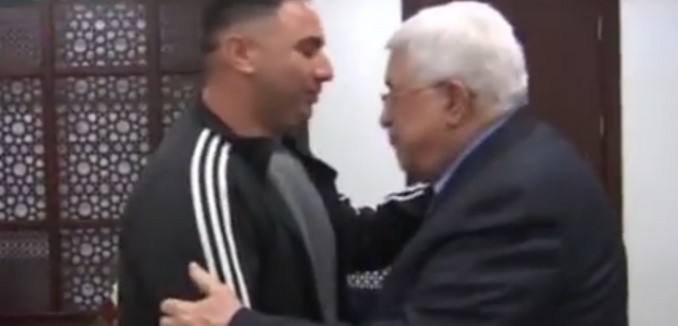“If your citizens were being routinely attacked by terrorists, which of you would tolerate a reward system that compensated the attackers for their crimes?”
That is the question United States Middle East peace envoy Jason Greenblatt reportedly asked members of the United Nations Security Council earlier this month. “The Palestinian Authority’s institutionalization of support for terrorism is unacceptable and must be called out, unequivocally by all of us. The time has come for everyone to stop looking the other way,” he told them.
The events that precipitated Greenblatt’s remarks were as follows: For years, it’s been known that the Palestinian Authority has incentivized terror by providing payments to terrorists who kill Israelis or tourists in Israel. If the terrorist dies during the attack, the payment is provided to his family. The size of the monthly payment increases with the length of jail time. In other words, the more serious the crime, the higher the payments.
In response to this policy, the U.S. passed the Taylor Force Act in 2018. The act is named for West Point graduate Taylor Force, who was killed by a Palestinian terrorist in 2016. It cuts off some (but not all) U.S. funding to the PA as long as the PA continues paying terrorists. Recently, the Israeli government decided to take similar action by withholding a small percentage of the tax money it collects on the Palestinian Authority’s behalf due to this pay-to-slay policy.
In response to the Israeli government’s decision to withhold $11 million, the PA decided not to accept the remaining $150 million that Israel is willing to transfer, worsening its own budget crisis.
The Palestinian Authority and several members of the UN Security Council, per usual, blamed Israel for the PA’s dysfunction.
In a March 10 op-ed in Haaretz, Saeb Erekat, the Secretary General of the PLO, dishonestly calls the terrorists “political prisoners” and the payments “a welfare system.” He writes of a “colleague” who was recently released from Israeli prison. That colleague, Khalida Jarrar, is a senior member of the Popular Front for the Liberation of Palestine, a terror organization known for airplane hijackings.
Erekat repeats the talking point that a high conviction rate of Palestinians in IDF courts is indicative of a “kangaroo court;” CAMERA debunked that point two years ago, pointing out that prosecutors only bring indictments in cases with extremely strong evidence. Erekat calls the Israeli tactic of withholding partial payment “gangster-style,” but it is the Palestinian Authority that effectively has a contract out on every Israeli.
Most importantly, in the op-ed, Erekat freely admits that these payments to terrorists are more important than the welfare of Palestinians living under PA rule. “Will this affect the functioning of our government?” he asks. “Yes. But this is a price that we are willing to pay for the dignity of our nation… .”
In covering the story, some in the media have downplayed the cash-for-kill policy. This makes it hard for readers to understand the nature of the Israelis’ and Greenblatt’s objections, and easier for the Palestinians to portray themselves as the victims.
For example, in a March 8 article about the UN session, Reuters called the payments “financial support to families of militants jailed in Israel,” and “stipends the PA pays to families of Palestinian militants killed or jailed by Israel.” There is no mention in the article of the crimes that were committed by the recipients of these “stipends.” Omitting the reason these attackers were killed or jailed makes them sound like they are the injured parties.
Even more surreal was a March 8 article in The New York Times, which characterized the PA’s payments as the “Palestinian Authority’s policy of paying stipends to Palestinian prisoners in Israel and to the families of Palestinians killed or wounded in confrontations with Israelis.” Confrontations? This could mean almost anything and is a convenient way of eliding the fact that the payments are for murder, that the more people killed, the higher the payments.
The Times writes that “the Trump administration’s Middle East envoy, Jason D. Greenblatt, accused Palestinian leaders of offering the stipends as a reward for acts of terrorism” (emphasis added). As noted above, the official PA policy provides that the longer the jail sentence — that is, the more heinous the crime — the higher the reward. By calling Greenblatt’s accurate observation a mere “accusation,” the Times implicitly calls its veracity into question, dodging its responsibility to tell the truth directly.
It’s odd, too, that the Times has so quickly forgotten how it was embarrassed less than a year ago when it claimed that such policies did not exist at all and were a far-right conspiracy theory. In April of 2018, it was forced to run a correction stating, “Palestinian officials have acknowledged providing payments to the families of Palestinians killed while carrying out attacks on Israelis or convicted of terrorist acts and imprisoned in Israel; that is not a conspiracy theory.” Less than a year later, the Times is once again unable to forthrightly acknowledge the true nature of these payments.
Barely a week and a half after Greenblatt’s comments, on Sunday, another terror attack killed two more Israelis, Rabbi Achiad Ettinger and Sgt. Gal Keidan. As Greenblatt pointed out, the family of the 19-year old suspected assailant will also likely be the recipients of these payments.
It’s apparent that the suffering of the Palestinian people is entirely acceptable to Palestinian leaders if that suffering can be used to make Israel look bad. Unfortunately, some in the media are happy to assist with this effort. In this case, the PA’s refusal of $150 million in tax transfers that Israel is willing to provide is sure to negatively affect Palestinians. The fact that the PA is doing so to take a stand on its ability to continue to pay murderers ought not to generate any sympathy for it.
[Photo: MEMRI TV Videos / YouTube ]




